 With a new prime minister having taken office last month, the government has started to announce its plans for stimulating the UK economy during the cost of living crisis.
With a new prime minister having taken office last month, the government has started to announce its plans for stimulating the UK economy during the cost of living crisis.
Kwasi Kwarteng delivered what has been called a “mini-Budget” in an aim to drive economic growth, against the backdrop of the Bank of England (BoE) reporting that the UK economy is already in recession.
Markets reacted negatively to the chancellor’s speech, with consequences including a sharp rise in the cost of government borrowing, the pound falling to a record low against the dollar, emergency BoE intervention, and sharp rises in the cost of mortgage deals.
Read on how to find out how the fallout from the speech will affect you, and how the reduction in Stamp Duty could save you some money when you buy a property.
Cuts to tax and National Insurance could boost affordability
In his mini-Budget, the chancellor announced a range of tax cuts designed to put more money in the pockets of individuals.
Firstly, the basic rate of Income Tax is being cut by 1p in the pound from April 2023 – a year earlier than planned – taking it down to 19%. The chancellor also announced a reversal of the 1.25 percentage point increase in National Insurance (NI) from November 2022.
These tax cuts are designed so you retain more of your income and could consequently provide a boost to mortgage affordability.
Banks and building societies base lending decisions on whether you can afford the repayments so it follows that, if your disposable income is higher, you would be able to afford higher repayments.
However, for many people, any savings made from tax cuts could be outweighed by a significant increase in mortgage repayments.
Higher interest rates
In the run-up to the mini-Budget, the BoE announced that it was raising interest rates by 0.5%, to 2.25%, to tackle the soaring inflation rate.
One of the consequences of the mini-Budget was that it drove up the cost of long-term borrowing. In addition, the speech prompted widespread expectation of a faster and higher jump in the Bank rate in the coming months.
In response, many lenders withdrew their mortgage products at short notice. Indeed, Moneyfacts reported that almost 1,000 mortgage deals were withdrawn from the market in just a few days at the end of September.
The BBC reports that, had you been looking for a new two-year fixed-rate deal in December 2021, the average rate on offer was 2.34%. By the start of October 2022 that had risen to 5.75%.
If you’re coming to the end of your current deal and looking to switch, you can expect to pay more for your mortgage. So, read our useful article with practical tips that can help you if you’re looking to switch.
With further rate rises likely in the coming months, the mortgage market is uncertain right now. So, speaking to an expert – whether you’re a first-time buyer, you’re moving home, or your mortgage deal is coming to an end – can help you navigate this tricky time.
Stamp Duty cut will reduce the cost of moving
If you’re thinking of buying a property, one positive outcome of the mini-Budget was that the chancellor announced some changes to Stamp Duty.
In his speech, Kwarteng announced two key measures with immediate effect:
- The threshold at which Stamp Duty becomes payable will rise from £125,000 to £250,000
- The threshold at which first-time buyers will start paying Stamp Duty will rise from £300,000 to £425,000. He also increased the value on which first-time buyers can claim relief from £500,000 to £625,000.
Kwarteng said: “The steps we’ve taken today mean 200,000 more people will be taken out of paying Stamp Duty altogether. This is a permanent cut to Stamp Duty, effective from today.”
A rise in the threshold to £250,000
If you’re moving home, the rise in the threshold from £125,000 to £250,000 will save you £2,500 if you are buying a house valued at more than £250,000.
The new rates are:
- Up to £250,000 – 0%
- The next £675,000 (the portion from £250,001 to £925,000) – 5%
- The next £575,000 (the portion from £925,001 to £1.5 million) – 10%
- The portion above £1.5 million – 12%.
The table below shows the savings you would make thanks to the threshold rise (it assumes you are not a first-time buyer).

If you’re buying a second home (for example, a holiday home or buy-to-let) you’ll normally pay a 3% Stamp Duty surcharge, but you’ll still benefit from this reduction.
Similarly, if you are not a UK resident for the purposes of Stamp Duty, you will usually pay a 2% surcharge and, again, you’ll benefit from this reduction.
Note that these changes apply in England and Northern Ireland. The devolved governments in Scotland and Wales are expected to also pass on cuts in due course.
If you’re buying your first home
To help more first-time buyers onto the property ladder, the chancellor also raised the threshold at which Stamp Duty becomes payable.
If you’re a first-time buyer, you’ll pay:
- No Stamp Duty up to £425,000
- 5% Stamp Duty on the portion from £425,001 to £625,000.
If you are a first-time buyer paying £400,000 for a property, this equates to a £5,000 saving.
Get in touch
In these uncertain times, it can pay to work with an expert if you’re buying a home or looking to switch your mortgage.
To find out how we can help you, please get in touch. Email [email protected] or call us on +44 (0) 20 3411 0079.
Please note
Your home may be repossessed if you do not keep up repayments on a mortgage or other loans secured on it.




